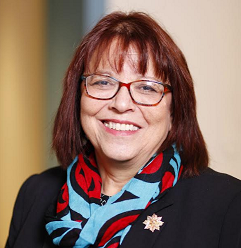Guest Opinion. Recent actions by the new White House administration show that funding for community-based organizations, higher education institutions, and rural programs are at risk of severe cuts in funding or even elimination.

Any pause of a federal agency grant, loan, or other financial assistance programs will harm not just Native American students attending tribal colleges and universities, but also many other community members attending these open enrollment institutions.
Although tribes created most tribal colleges to provide their tribal members with an affordable, accredited, culturally and community-based higher education, these institutions are open to everyone. TCUs are located in mostly remote, rural communities that are often underserved by higher education institutions. For many people living in rural communities, a tribal college education is not merely a convenient alternative to attending another college or university, it is the best and sometimes only choice for a higher education due to their geographic proximity, affordability, and community focus.
All TCUs offer higher education opportunities designed to meet the workforce needs of their communities. The American Indian College Fund serves 35 accredited tribal colleges with 75 campuses located in 13 states in the Southwest, the Northwest, and across the Great Plains from Kansas and Oklahoma to Minnesota and the Dakotas—which serve a combined annual enrollment of nearly 22,000 students.
These remarkable and already seriously under-resourced institutions all offer trade certification and workforce education and associate degree programs. Many offer bachelor’s degree programs and a few offer master’s and Ph.D. programs.
Popular majors include business, health professions, construction technology, teaching, and the STEM fields (science, technology, education, and mathematics). Our graduates have gone on to serve as doctors, engineers, teachers, environmental scientists, construction workers, social workers, and more. Many have started their own businesses serving their communities and employing community members.
At a time when a competitive workforce is needed more than ever, contrasted with the rising cost of higher education, tribal colleges offer a real and rare value for their students, most of which are non-traditional students. The majority of TCU students have lower incomes and cannot afford to relocate to attend college for financial reasons or due to family responsibilities keeping them in their home communities. In addition, only 3% of TCU graduates took student loans as compared to 19% of students nationally, leaving them debt free as they pursue their preferred careers after graduation, according to a recent survey of TCU alumni conducted jointly by Gallup, the Strada Education Network, and the American Indian College Fund.
How is this possible? Most TCUs do not offer federal student loans to their students. Instead, many, like Tohono O’odham Community College in Arizona, lower the cost of tuition or subsidize tuition to support enrollment and to ensure students graduate without high student loan debt and with the credentials or degrees they need to enter their careers.
Scholarships from the American Indian College Fund, which are funded by individuals, family foundations, and corporate donors, fill in the gaps and help cover the cost of books, supplies, room, board, and transportation. With this important support, our Full Circle scholars at TCUs graduate at almost two times the rate of Native students nationally.
Graduating debt-free has a positive impact on college graduates' financial well-being. They can afford to enter the workforce in their own communities, creating greater economic wellbeing in the process. In fact, 74% of tribal colleges alumni surveyed by Gallup are using their tribal college education in their careers to do just that. In addition, TCU graduates are nearly twice as likely as college graduates nationwide to report that they are thriving financially, socially, and at work. Nearly 60 percent of TCU alumni say that their schools were “perfect” for them, while nearly 70 percent agree that their education was worth the cost—opposed to 39% of college graduates nationally.
Taken as a whole, TCUs are small but mighty pipelines to a better future, offering great value for students, community members, and taxpayers.
Native Nations and rural America cannot afford to lose the economic, educational, and cultural opportunities TCUs offer. Our communities need the skills and talents of tribal college graduates. And deserving students need the opportunities a TCU education provides them to access a better life.
Our nation cannot afford to throw away talent. Our nation’s competitiveness, economic stability, and very future depend on education—for all of its people.
Cheryl Crazy Bull, Wacinyanpi Win (They Depend on Her), the President and CEO of the American Indian College Fund, is a citizen of the Sicangu Lakota Nation. She has been in her position with the American Indian College Fund since 2012.
More Stories Like This
What Michigan Owes Its Tribal NationsBuilding a Stronger Nation Through Service
Is Oil Worth More Than Water?
Tribal Economic Development Programs in the Federal Contracting Environment: What They Are, and What They Are Not
Why Redefining Public Health Degrees Would Harm Native and Rural Communities
Help us defend tribal sovereignty.
At Native News Online, our mission is rooted in telling the stories that strengthen sovereignty and uplift Indigenous voices — not just at year’s end, but every single day.
Because of your generosity last year, we were able to keep our reporters on the ground in tribal communities, at national gatherings and in the halls of Congress — covering the issues that matter most to Indian Country: sovereignty, culture, education, health and economic opportunity.
That support sustained us through a tough year in 2025. Now, as we look to the year ahead, we need your help right now to ensure warrior journalism remains strong — reporting that defends tribal sovereignty, amplifies Native truth, and holds power accountable.
 The stakes couldn't be higher. Your support keeps Native voices heard, Native stories told and Native sovereignty defended.
The stakes couldn't be higher. Your support keeps Native voices heard, Native stories told and Native sovereignty defended.
Stand with Warrior Journalism today.
Levi Rickert (Potawatomi), Editor & Publisher

